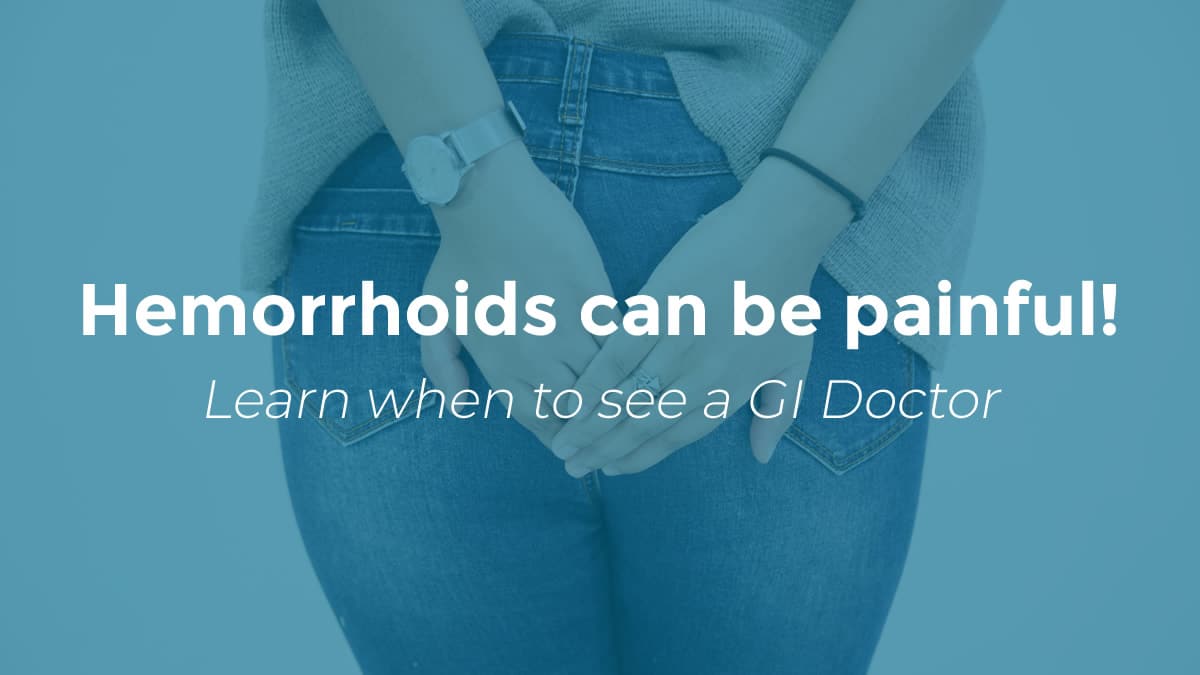Hemorrhoids are a sensitive and oftentimes uncomfortable topic, yet many of us either have or will deal with hemorrhoidal symptoms at least once during our lives. Here we’ll tackle the most frequently asked questions I get at my gastroenterology clinic in Bedford, TX regarding hemorrhoids and how to handle them.
For more in-depth information on symptoms, causes, and treatment options please visit our hemorrhoids web page.
Hemorrhoid Frequently Asked Questions and Answers
Are Hemorrhoids Common?
Hemorrhoids are very common, with three out of every four adults experiencing hemorrhoidal symptoms at some point in their life. During pregnancy, hemorrhoids are common due to the increased blood flow and pressure on the hemorrhoidal vessels caused by an enlarged uterus. Hemorrhoids are also likely to enlarge and cause problems when you’re often straining during bowel movements or if you’re obese.
What do Hemorrhoids feel like?
While some may not feel any symptoms from their hemorrhoids, it’s common for many to feel itching and pain from swelling. In addition, you may also experience soreness or the feeling of tissue bulging during bowel movements. When hemorrhoids prolapse or bulge out of the rectum, the mucus that’s naturally present on the hemorrhoidal surface irritates the anus, causing itching.
Are Hemorrhoids Always Painful?
No. Oftentimes, hemorrhoids at painless, so you may still experience painless rectal bleeding. This bleeding is a few drops that appear bright red on toilet paper. Both internal and external hemorrhoids can present painlessly.
TIP: All bleeding is abnormal and should be evaluated by a medical professional.
Are Hemorrhoids Cancerous?
Hemorrhoids themselves aren’t cancerous, but it’s important to make an appointment with your physician if you’re having hemorrhoidal symptoms. This is because there is a chance your symptoms could be caused by colorectal or anal cancer.
These cancers come with additional symptoms that are not associated with hemorrhoids, such as:
- Change in the frequency of bowel movements
- Abdominal pain
- Weight loss
- Nausea or vomiting
Can Hemorrhoids Pop or Burst?
A hemorrhoid cannot pop in the way that a pimple can. Hemorrhoids are swollen or inflamed anorectal veins that can bulge out from your anus. When the pressure inside a swollen hemorrhoid increases, it may pop, secreting blood and/or pus. This is a rare occurrence because the days leading up to a hemorrhoid popping are extremely painful, likely causing you to seek medical care before that happens spontaneously. It’s important to note that you should never pop a hemorrhoid yourself as that can makes matters worse.
If a hemorrhoid bursts at home you can expect it to bleed for no more than 10 minutes, but bowel movements can aggravate the area causing a small amount of additional bleeding. Make an appointment with your doctor if your hemorrhoid bursts. You should also try a sitz bath for pain relief and infection prevention in the meantime.
Can Hemorrhoids cause Constipation or Diarrhea?
Constipation and diarrhea are two of the main causes of symptomatic hemorrhoids due to excessive straining causing anorectal pressure. If you’re in pain due to hemorrhoids and holding in bowel movements due to the discomfort they cause, you can become constipated. It’s important to make sure you’re eating fiber-rich foods, drinking plenty of water and getting exercise each day to avoid constipation.
If hemorrhoidal pain makes you want to avoid the toilet altogether, you can try the following to ease your discomfort:
- Sitz baths
- Ice packs
- Over the counter pain medications
- Topical creams and wipes
Will Hemorrhoids Go Away on Their Own?
For some, hemorrhoids disappear then seemingly reappear on their own. If your hemorrhoid isn’t fully prolapsed and can be managed with conservative treatments, it’s possible it can go away for periods of time with no symptoms in between.
You’re likely to have your hemorrhoids reappear during:
• Excessive lifting
• Prolonged time sitting on the toilet
• Pregnancy
• Excessive straining
Can Hemorrhoids Cause Bleeding?
Yes, hemorrhoids can cause bleeding. But it’s important to take note that all bleeding is abnormal and should be evaluated by a physician. Never ignore rectal bleeding.
When to see a Doctor about your Hemorrhoids?
You’ll need to see a doctor about your hemorrhoids if:
- You’re experiencing bleeding.
- OTC and home remedies aren’t relieving your symptoms.
- The hemorrhoids aren’t going away or are worsening.
- The pain is causing you to be unable to have a bowel movement.
- You’re unable to function because of the discomfort the hemorrhoids are causing you.
What are Hemorrhoid Treatment Options?
Some hemorrhoid treatment options include:
At-home treatments
- Sitz baths
- Wiping gently with a moist towelette
- Eating more fiber
- Drinking more water
- Exercising daily
Over the counter treatments
- Pain medications like acetaminophen or ibuprofen
- Witch hazel pads
- Creams
- Suppositories
Hemorrhoid Banding
- This is the most common hemorrhoid treatment in the United States. This can be done right in your GI doctor’s office and only takes a few minutes. Hemorrhoid banding is a painless procedure that causes your hemorrhoids to fall off within days.
- To learn more, please visit our hemorrhoid banding web page.
Can Hemorrhoids Be Removed Permanently?
Yes – hemorrhoids can be removed permanently with the use of banding and other surgical options. However, this doesn’t guarantee that new hemorrhoids won’t develop in the future. This is why it’s so important to take appropriate measures to avoid constipation and activities that increase pressure on your rectum.
Which Doctor Specializes in Hemorrhoid Treatment?
A gastroenterologist or gastrointestinal (GI) doctor specializes in hemorrhoid treatment. A gastroenterologist is an expert on the entire digestive system and is most qualified to appropriately manage your hemorrhoids.
If you’re looking for the best gastroenterologist in Bedford, TX area, I’ll invite you to read our patient reviews and testimonials to better understand the expert care and service his practice provides patients.
How does a GI Doctor Diagnosis Hemorrhoids?
Methods a GI doctor uses to diagnose hemorrhoids are:
- The gathering of your health history and risk factors.
- A careful physical examination that’s both internal and external.
- Sigmoidoscopy – A small camera is inserted to look into your rectum.
- Anoscopy – A small camera is inserted to examine your anal canal.
Concerned You’re Suffering From Hemorrhoids?
If you’re concerned you’re suffering from hemorrhoids, it’s important to make an appointment with a gastroenterologist to get a thorough diagnosis and treatment plan.
If you’re local to the Dallas-Fort Worth area, go ahead and make an appointment online or give my office a call at (817) 267-8470. I’d be honored to help you.



